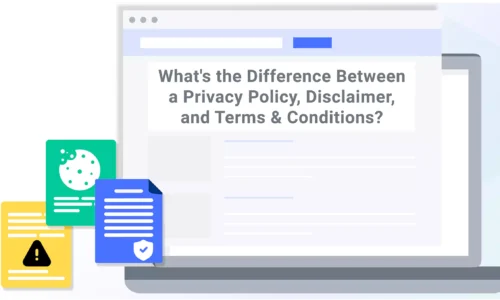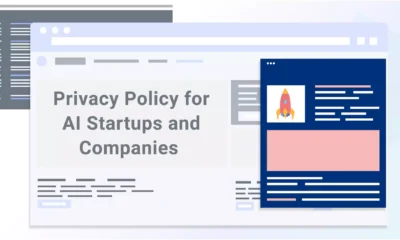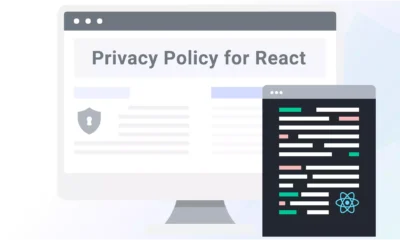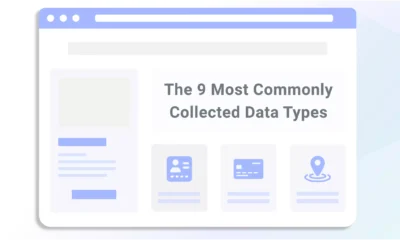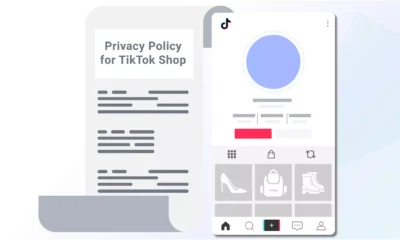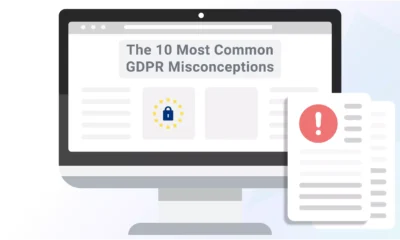If you own a website, there are several different legal documents you need to publish, like a privcay policy, disclaimers, and a terms and conditions agreement, in order to make your site user-friendly and align with legal requirements.
Below, I breakdown the three common legal documents and statements you should have on your website or app and explain how they differ from one another.
Remember, Termly is an easy-to-use free solution for generating a privacy policy, terms and conditions, disclaimers, and more.
What Is a Privacy Policy?
A privacy policy is a detailed breakdown of when your website collects, uses, stores, transmits and destroys information from users. You may think of a privacy policy as a way of building trust with users, and therefore not an essential document.
Increasingly, however, online privacy protection is a matter of law. Posting and complying with a privacy policy is no longer an option, but an obligation.
It’s important to note that, due to the nature of technology, you may unknowingly collect information about website visitors. Any site that uses cookies or tracking technologies to collect data, even if that data is not connected to a street address or name, has access to private information.
Digital analytics software collects information from users browsing your site before they have even ordered a product or service.
For this reason alone, it’s essential to create a privacy policy tailored to your website that users can easily find on your homepage, and not just as a pop-up once visitors enter credit card information.
If you’re short on legal counsel, consider using Termly’s privacy policy generator to create this essential document, or make your own starting with a sample privacy policy template.
In order to stay compliant, the Federal Trade Commission advises website owners to review and adhere to their own privacy policies, or they could face legal action. State law may also require that online entities have privacy policies in place.
GDPR requirements also impose strict penalties on companies that do not protect the privacy of EU citizens accessing websites, regardless of where those websites are located.
If you make any amendments to your data collection policies, then you need to make privacy policy changes accordingly. Informing users of changes is an important part of keeping your website compliant.
What Is a Terms and Conditions Agreement?
The terms and conditions of your website, also called the terms of use, are the general rules of using your website. These go beyond a promise of how you will handle privacy matters.
Before the advent of ecommerce, terms and conditions were most commonly used to set the terms of a transaction between a business and its suppliers and customers.
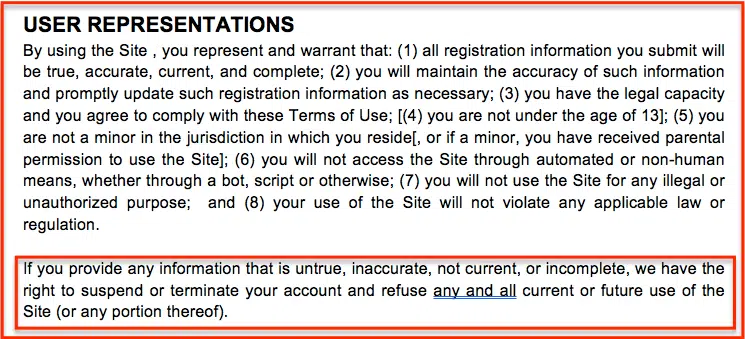
In the case of an online store, the terms and conditions determines what will happen in the event of a sale. Essentially, it enables you to structure your return policy, shipping deadlines, and any other details that are essential to the transaction.
While your online store may display a product with a price attached, the terms and conditions offer the “fine print” as to what actually occurs when a user surfing your website decides to purchase and wants to enter their credit card information.
Your legal policies should be tailored specifically to your website, so it’s crucial that you avoid the temptation to copy another website’s policies.
The FTC does not require you to have a terms and conditions document on your website; in fact, it’s entirely possible, from a legal standpoint, to do business without one.
However, doing so is akin to making a handshake deal in real life versus having a written contract. With a handshake deal, you’re taking the other party at their word that they will uphold their obligations.
Additionally, most app stores require that an app terms and conditions be posted within your app or on and accompanying site in order for it to be made available to the public.
Using a free terms and conditions generator allows you to set the rules of your site or app, be it establishing guidelines for proper user behavior on your discussion forum or signing up for a free trial of your online app.
What Are Disclaimers?
Although many people are said to ignore disclaimers because they appear so frequently, they are an important part of business correspondence. They are also a common sight on websites to remind users of the limitations of the service provided.
An excellent disclaimer example is found on most law firm websites, stating that the information is of a general nature only and not to be used as legal advice.
The intent of that kind of a disclaimer is to prevent someone from suing a law firm after suffering harm from following general advice they received from the site.

Legal disclaimers vary depending on the nature of the product or service sold.
Most licensed professionals, including lawyers and doctors, must adhere to specific rules about advertising their services. Otherwise, they could be faced with losing their licensure or sanctions from the licensing body.
Non-licensed entrepreneurs who sell a particular type of product, such as health supplements, must adhere to specific FDA guidelines that prohibit sellers from making unsupported health claims.
Whenever you sell a product online, it’s essential to review the legal body that governs your industry so you can generate a disclaimer unique to your site that limits your liability.
Creating a disclaimer for your website will limit or prevent legal liabilities and claims in the event a user misinterprets your site content.
In order to decide what kind of information to use in a disclaimer, it’s a good idea to do a self-assessment of how your website will be, or could be, used. Upon consultation with a lawyer, you may want to include any potential risks to users in a disclaimer.
For example, if you are a third-party reseller of consumer goods, you may want to affirm that you do not take responsibility for the condition of the goods once shipped by the third party.
In essence, a disclaimer is intended to limit liability, but you should speak with a lawyer if you have significant concerns about the ultimate well-being of those who use your website.
You Need All Three
Before you launch your website, you should use these documents to both comply with the law and protect yourself from liability.
Taking these proactive steps, even when it’s not explicitly required, can help ensure you’re on firm ground in the event of a legal dispute and that you are offering a positive image of professionalism to your users.
For more information, check out these additional resources:
- What is the difference between a privacy policy and terms and conditions?
- Is a disclaimer the same as terms and conditions?
- What legal documents do I need on my website?
Reviewed by Masha Komnenic CIPP/E, CIPM, CIPT, FIP Director of Global Privacy


